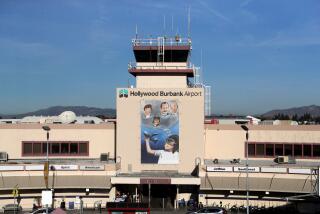Airport Agency Won’t Commit to Restrictions
- Share via
Burbank Airport officials hedged Thursday when pressed to accept flight caps and curfews to allay opposition to a new terminal.
At a contentious public summit, airport Executive Director Thomas E. Greer said the facility “will pursue all reasonable, feasible and legal options, including caps and curfews” to resolve the long-running terminal issue.
But moments later, Burbank-Glendale-Pasadena Airport Authority President Joyce Streeter would not commit to implementing mandatory flight restrictions if the airport were granted authority to do so.
Airport officials have long maintained that only the Federal Aviation Administration can mandate such curbs on aviation. State Sen. Adam Schiff (D-Burbank) asked Streeter if the airport would implement flight restrictions if the FAA gave Burbank such authority.
She said the airport would not do so without first seeking input from the airlines and other aviation interests.
The meeting at the Autry Museum of Western Heritage in Griffith Park was attended by more than 200 people. It was convened by Schiff to allow state legislators to participate in the debate over the planned terminal.
Greer said the current terminal is in a virtual “crash zone” near the east-west runway and could never be built under modern safety standards.
But Burbank Mayor David Golonski, who wants to limit airport growth, said Greer and others are hyping the safety issue to ram a larger terminal down the city’s throat.
“If safety were the only issue, a replacement terminal would already have been built,” Golonski said.
But Diran Torigian of the Airline Pilots Assn. said Burbank faces a real threat of a passenger jet piling into a terminal.
“A minor incident at some other airport could turn into a major catastrophe at this airport,” said Torigian, a United Airlines pilot. “This has the potential for the worst aviation accident in the country.”
Among those listening to the debate were state Sen. Betty Karnette (D-Long Beach), who chairs the Senate Transportation Committee, and Assemblyman Tom Torlakson (D-Antioch), who chairs the lower house’s Transportation Committee.
Because aviation is a federal domain, however, it was not clear what impact, if any, Thursday’s meeting would have on the terminal controversy.
Schiff, however, said he believed the state might be able to provide financial aid for possible noise mitigation measures.
He also said the community should not wait for Washington to provide a solution, but develop one locally.
“My sense is that the FAA is loath to intrude on a local issue,” Schiff said. The Airport Authority wants to build a 19-gate terminal that would serve 5 million passengers annually.
Airport neighbors in Burbank and elsewhere contend that the new terminal would bring too much noise and traffic to the east San Fernando Valley.
The Burbank City Council, which once supported the new terminal, has changed course after a political shake-up in City Hall and is now suing to block the project.
Burbank city officials have offered to drop litigation, however, if the airport’s governing board agrees to limits on flights, mandatory curfews and a 16-gate terminal.
They also argued that the size of the new facility should be driven by passenger demand, now 4.7 million travelers per year, and not other considerations.
“Noise is neither appropriate nor justified as a reason to jeopardize construction of this project,” airport spokesman Victor Gill said before the meeting. “This airport meets national airport policy goals of the quietest jets, and secondly, we are committed to insulate all remaining homes impacted by noise under law.”
Last August, Federal Aviation Administrator Jane Garvey came to Burbank and pledged that her agency would work with local officials to find a solution to the bickering over aircraft noise.
Garvey’s deputy chief of staff, Marie Therese Dominguez, said this week the agency has agreed to review whether the airport can impose mandatory noise restrictions without completing a costly federal study.
Even before the meeting, some expressed skepticism over Schiff’s motives, which they said were related more to a possible bid to challenge Rep. James Rogan (R-Glendale) for his 27th District seat in the 2000 election.
Schiff, however, said his motivation was not political and said he is willing to work with Rogan on a solution.
Rogan has pressed Garvey to clarify Burbank’s argument that there is a loophole in federal law that will allow Burbank Airport to impose a mandatory 10 p.m. to 7 a.m. curfew on passenger jets, replacing the existing voluntary restriction.
In February, he also called a summit on the airport, inviting Rep. John J. Duncan Jr. (R-Tenn.), chairman of the powerful House Aviation Subcommittee, to meet with local officials April 8. That session has since been moved to May.
“It’s interesting that at the same time we are pushing for a local solution that Congressman Rogan is pushing for a federal solution,” said Peter Kirsch, special counsel to Burbank on airport issues. “Administrator Garvey’s support would certainly be helpful, but we aren’t going to solve this debate unless there is an agreement locally on what the proper solution should be.”
More to Read
Sign up for Essential California
The most important California stories and recommendations in your inbox every morning.
You may occasionally receive promotional content from the Los Angeles Times.









